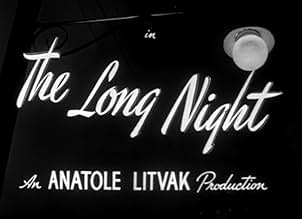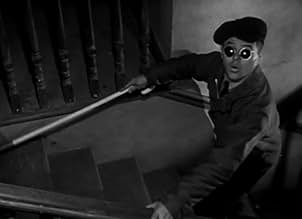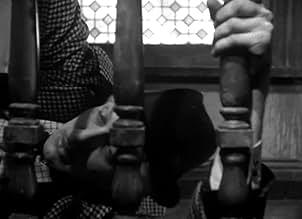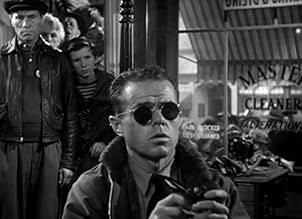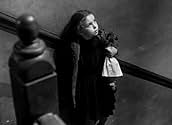Ajouter une intrigue dans votre languePolice surround the apartment of apparent murderer Joe Adams, who refuses to surrender although escape appears impossible. During the siege, Joe reflects on the circumstances that led him to... Tout lirePolice surround the apartment of apparent murderer Joe Adams, who refuses to surrender although escape appears impossible. During the siege, Joe reflects on the circumstances that led him to this situation.Police surround the apartment of apparent murderer Joe Adams, who refuses to surrender although escape appears impossible. During the siege, Joe reflects on the circumstances that led him to this situation.
- Réalisation
- Scénario
- Casting principal
- Récompenses
- 4 victoires au total
- Peggy
- (as Patty King)
- Freddie
- (as Robert A. Davis)
- Ticket Taker
- (non crédité)
- Mac - Bartender
- (non crédité)
- Nightclub Patron
- (non crédité)
- Audience Member
- (non crédité)
- Audience Member
- (non crédité)
- Millie - Saloon Waitress
- (non crédité)
Avis à la une
of Prévert's lines -when a poetic dialog is translated into another language,there's always a problem- it loses much of its appeal)
Although one of the best actors in American cinema,Henry Fonda could not succeed in Gabin's plebeian part.Ann Dvorak is the most adequate choice since her swagger imitates Arletty's.
And who could forgive the new ending?
Litvak, a talented director, stages this film in an interesting manner - it begins with a blind man (Elisha Cook Jr.) stumbling across the body of Maximilian in the hallway of the apartment building where he lives. Joe will not leave his room, and the police work throughout the film to get him out. The photography and direction capture the darkness and drabness of Joe's surroundings, the cheapness of the nightclub where Maximilian performs, and focuses a harsh light on Charlene's room and Charlene herself.
Despite all of this great style, the film has a cheesy quality; the characters aren't really likable except for poor Joe; and the motivations of the characters aren't fully fleshed out, so the story ultimately doesn't make it. The acting is very good - Fonda shows us some still waters that run pretty deep in an excellently crafted performance. He's sexy as all get-out, too, when he lays down on Charlene's bed and smiles. Dvorak does a great job as a brittle Charlene, and Price is a complete sleazebag as the cruel Maximilian. Bel Geddes is incredibly young - this is her first film, and though she was 24 or 25, she looks and acts about 18, which is appropriate for this small-town, inexperienced girl.
"The Long Night" has some interesting elements, but because of a spotty script, we're not invested enough in the film for it to be really intriguing or exciting.
While I could never take my eyes off the screen, it should be said that for all of the strong craftsmanship with the picture (it's one of the finest photographed 'noirs' of the late 40s, especially for those stark scenes of Joe alone in his room with the whole town on the street calling for him) and for all of the tremendous talent in front of the camera- besides Fonda and Price, who the former it's a splendid and rewarding if not best-ever performance and for the latter a triumph of playing sneaky and villainous, the girl playing Jo Ann (Barbara Bel Geddes) is very good- it only works up to a point. I was engrossed the most in the last twenty minutes or so, as the film revved up its pace and tempo to the "will Joe or won't Joe" beat. Before that, it's many scenes that mostly rely on the presence of the actors to uplift the material past the breezy and conventional air of the dialog. There's nothing especially "wrong" with the material, but it doesn't go anywhere aside from hitting its main points.
The Long Night is something of a minor lost marvel- only recently did it come out on DVD in an OK print- and for Fonda and Price fans its a can't-miss kind of picture. Just don't go expecting anything that will change your perception of what film-noirs can go that don't go for the easy routes.
The real point of interest to me was the action of the police, who behave a lot like the fascists that Joe Adams spent years fighting in WWII. Sure they have a murderer holed up in his rented room, but he's holding no hostages, they've emptied the building, and still they spray him twice with automatic gunfire unannounced - once from the outside into his window, then from the stairwell into the door. When he pushes a sturdy dresser against the door and they realize they can't force their way in THEN they try talking to Joe, starting with the line "We're not fooling"?? No kidding! After Fonda's speech to the crowd, once the crowd starts voicing their support for Joe and promising financial help with a lawyer the police form a line and practically trample the crowd forcing them out of the street. I don't know if the heavy handedness of the police was something that Litvak wanted the audience to notice, but it was something I noticed.
I'd recommend this one just for the good performances and atmosphere and some imagery you don't see that much in films immediately after WWII, but don't expect something shocking or even interesting to happen just because of all of the talent assembled here.
The film is a talky picture about a brooding guy (Henry Fonda), his sweetie-pie (Barbara Bel Geddes) and a completely bizarre blabber-mouth (Vincent Price). Fonda and Bel Geddes are in love but Price is determined to break them up--and push Fonda to the breaking point. The story is told through flashbacks and is similar to the Jean Gabin film--without the film noir camera-work and lighting. Also, the American version comes off as much talkier--much. All in all, not a terrible film at all--but not the 9 that the other film deserved when I rated it a couple years ago.
Le saviez-vous
- AnecdotesFilm debut of Barbara Bel Geddes. She was signed to a seven-year contract with RKO after this film. Director Anatole Litvak cast her after seeing her on Broadway as the female lead in "Deep Are the Roots", which played at the Fulton Theatre for 477 performances beginning 26 September 1945.
- GaffesWhen Joe from inside his apartment shoots at the cops who are standing outside his door; it leaves bullet holes in the door. But on a following cut after speaking with the little girl and going back into his apartment; there are no bullet holes on the interior side of the door.
- Citations
Maximilian: [to Jo-Ann] You have sharp nails like a little animal. Maybe that's what I like about you.
- Crédits fousOpening card: "...the night is long That never finds the day..." William Shakespeare, Macbeth, Act IV, Scene III
- ConnexionsFeatured in Henry Fonda: The Man and His Movies (1982)
Meilleurs choix
- How long is The Long Night?Alimenté par Alexa
Détails
Box-office
- Montant brut aux États-Unis et au Canada
- 1 000 000 $US
- Durée1 heure 41 minutes
- Couleur
- Rapport de forme
- 1.37 : 1
Contribuer à cette page



